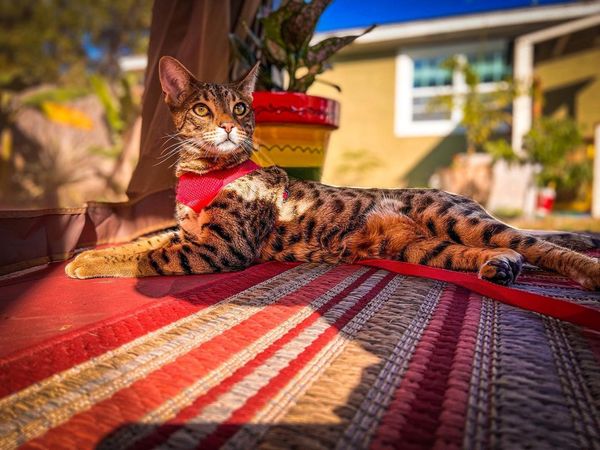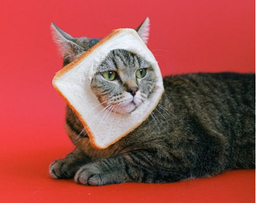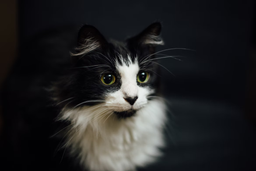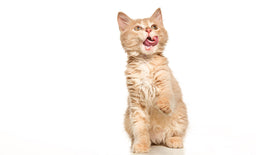What to add to a Savannah cat food diet—regular products or something wild?
Savannah cats are exotic beauties crossbred from servals, a large-eared wild cat species native to Africa. This breed’s hybrid DNA makes them long-limbed and relatively larger than average indoor kitties. If you’re raising one of these kitties, you must have noticed the massive confusion surrounding the Savannah cat food diet on the internet.
Because Savannah cats are relatively rare in the UK, you’ll come across conflicting opinions about what to feed them. Some people recommend raw food as it's closer to the natural diet of predators, while others say this breed is perfectly okay eating wet or dry food like other domesticated felines.
Another burning question is whether Savannah cats need food tailored to their filial designation, i.e. generational status. If you’re curious whether an F5’s diet should be different from an F2’s, you’re not alone! In this guide, Untamed explores:
- Suitable diets for Savannah cats
- Specific guidelines for filial designations

Savannah kitties are unique, cheeky, and super playful. With the proper diet, they’ll always be up for new adventures (and bad puns)!
Source: empyr69er
What do Savannah cats eat?
Even though Savannah cats carry a wild card in their DNA, their dietary needs are similar to domestic felines. All cats need meals based on whole meat, fish, and organs with high protein values, moderate fat content, and almost zero carbs. When choosing products, ensure these vital nutrients are in portions recommended in the table below:
|
Nutrients in cat food |
Recommended range |
|
Proteins |
Above 50% |
|
Fats |
Up to 20% |
|
Carbohydrates |
Not more than 3% |
Nutritionists point out that Savannah cats, being large, need higher doses of essential amino acids like taurine and arginine than average cats. A general rule of thumb is to give your kitty about 10–12 milligrams of taurine for every kilogram of their weight.
The preferred choice of meat for Savannah kitties should be lean products like chicken breast and liver, turkey, salmon, tuna, and prawns, which are loaded with taurine and arginine. These micronutrients are also present in eggs, beef, pork, and lamb, which are not recommended for everyday consumption because they are high in fat.
The pros and cons of different diets for Savannah kitties
Savannah cats are infamously picky, so it’s hard to find the product that impresses them and keeps them healthy at the same time. Let’s investigate how this breed responds to different types of cat food.

I only look wild, but my heart’s tame. I don’t need anything special, hooman—only food that’s true to my system!
Source: sal_n_scar_the_cats
Raw diets for Savannah cats—safety is a major concern
There’s a reason why cats in the wild have shorter lifespans than indoor cats. Raw meat is biologically suitable for felines, but it’s often compromised with Salmonella, E. coli, and other bacteria that cause food poisoning.
Savannah cats love raw meat, but studies have repeatedly shown that raw diets are unsafe for pets and the humans around them. Here’s a summary of the risks associated with:
- Commercial raw diets (B.A.R.F. products)—Many commercial raw food products across Europe might be contaminated with superbugs (drug-resistant microbes), which can only be destroyed by thermal processing. Exposure to such bugs is life-threatening not only for pets but also for humans, especially kids and senior citizens with weak immune systems
- Home-prepared raw diets—Even with the strictest sanitary protocols, storing and handling raw meat at home can cause bacteria to spread from hands to kitchen surfaces and other cooking materials. Remember that freezing doesn’t kill all bacteria in meat
Some cat parents suggest weaning Savannah kittens by introducing them to ground raw chicken or fish. It is an extra-risky move as even mild exposure to pathogens and parasites can trigger a gastric episode in kittens, which can turn lethal due to their low body mass.
Savannah kitties and dry food
Dry food is inexpensive, hygienic, and easy to store, but vets don’t recommend it to any cat, let alone Savannah. Biscuits are not real meat, but a processed cocktail of feed-grade ingredients, such as:
- Undefined bone, meat, and fish derivatives
- Grains and vegetables
- Plant proteins
- Milk and dairy products
- Sugar and starch
Many Savannah cats don’t warm up to dry food because it’s not satiating enough. It’s common for this breed to venture out in the garden hunting icky bugs and birds if they’re dissatisfied with kibble meals.
Besides low desirability, the high carb, high fat, and low moisture values of dry food increase the risk of multiple feline health conditions, including:
- Diabetes
- Obesity
- Stomach sensitivity
- Constipation and IBS
- Bladder stones
- UTIs (Savannah cats are highly prone to FLUTDs)
- Kidney failure

What’s on the menu today, hooman? I must warn you, I’m going to run away to the wilderness if it’s biscuits again.
Source: giguerecats
Wet food is the best for Savannah cats
Quality wet food with whole meat is the best choice for domestic cats. You don’t have to worry about food-borne pathogens because wet food is adequately cooked and hygienic. Your kitty will absorb nutrients directly from meat, which is naturally palatable to them. A regular wet food diet is excellent for maintaining urinary tract health throughout life.
Unfortunately, not all wet food products are equally good. Your kitty may reject products with low meat content and heavy fillers. When buying wet food, pay attention to the:
- Protein source—Opt for products that offer whole meat as the protein source, not subpar alternatives like meat derivatives, gluten, or casein (milk protein). Be wary of products with plant proteins (like pea or potato proteins) that don’t have essential amino acids like taurine and can lead to a nutritional deficiency. Savannah cats on poor quality proteins tend to look scrawny and lose fur in patches
- Filler content—Hard-to-digest fillers like grains, fibres, legumes, fruits, powdered cellulose, and veggies should strictly be under 3% of the gross ingredients. If a product doesn’t mention its filler content, you can calculate it by deducting the crude protein, crude fat, and moisture percentages from 100. Products with excessive fillers can lead to gastrointestinal issues, such as:
- Gagging and regurgitation
- Vomiting
- Diarrhoea
- Bloating
- Inappetence
- Additive profile—Many manufacturers rely heavily on taste enhancers, food colourants, and chemical preservatives to make their food palatable, presentable, and long-lasting. These ingredients can irritate your kitty’s tummy and trigger food allergies
Wet food true to feline roots—Untamed keeps it real!
If you want to raise fit and healthy Savannah kitties, you shouldn’t be stingy with quality proteins. Untamed brings you grain-free wet food made with 60%–63% whole meat, naturally rich in taurine, arginine, and other essential micronutrients. Our protein content is twice as high as the industry average!

Nutrition shouldn’t be tamed—It’s all systems go when kitties get their proteins from the right sources!
Image (c) Untamed
We make our gravy and jelly products with the best cuts of human-grade meat because it has a better nutrition profile than feed-grade scraps from the slaughterhouse. Your Savannah kitty will stay gorgeous and healthy with regular Untamed meals!
Our recipes are designed by vets to serve every breed and are free of animal byproducts, vegan proteins, sugar, and artificial additives. Every Untamed meal is:
- Balanced—Our food offers all required nutrients. You won't have to worry about feline protein or vitamin deficiencies after switching your pet to our complete meals
- Easily digestible—We steam our meat gently to bring out its tenderness, making it easy for your kitty to digest and absorb nutrients from the food
- Allergen-free—Our formulas are safe and free from all known allergens. We also offer single-protein dishes for kitties with sensitive digestive systems
- Yummy—We’re confident in what we serve! Kitties of all sizes and temperaments fall in love with the enticing aroma and delicate flavours of our dishes!
We offer a versatile menu of chicken, duck, ham, tuna, salmon, mackerel, sardine, and shrimp meals. Take our TRY NOW quiz and tell us what your kitty prefers—we’ll send you a taster pack at a rocking price!
Untamed meals work for a cat in any life stage!
We make products appropriate for all life stages. Our meals:
- Help kittens grow—Kittens need frequent high-protein meals in small portions. If you’re raising a kitten, Untamed products can promote balanced weight gain and muscle development
- Keep adult cats fit—Our dishes fit into multiple diet plans for adult felines. You can use our products to:
- Manage feline diabetes
- Help your kitty gain or lose weight
- Prevent FLUTDs
- Boost health in senior cats—Our food supports digestion in old kitties and prevents frequent barfing and loss of appetite
Cats of various breeds have flourished on our products. Here’s what our satisfied clients say about the many bonuses of going Untamed:
|
Timeline |
The fantastic Untamed effect! |
|
One week |
|
|
Two months |
|
|
Four months |
|
|
For life |
|

A scrumptious feast that naturally pulls kitties in—Untamed answers the call of the wild!
Image (c) Untamed
You don’t have to hunt with Untamed’s super fast delivery system!
Untamed makes pet-food shopping pretty straightforward and efficient. You can order our cat food online and get them delivered to your doorstep within a day, with free shipping! If you fancy regular supplies, we can send you monthly Untamed rations around the same dates. We offer the most flexible subscription for cat food—you can cancel or modify an order anytime.
Ordering our taster pack is quick and convenient:
- Take our TRY NOW quiz
- Select products you like
- Place the order
Untamed is a Carbon Neutral brand. We value ethical cat food and contribute to maintaining our environment by:
- Using fully recyclable packaging
- Getting meat from cruelty-free and sustainable sources
- Buying seafood from responsible, dolphin-safe sellers

F2 to F8—a shrinking fate! True generation gap is when you’re only one-fourth the size of your great-great-grandparents!
Image (c) Untamed
Savannah cat feeding guidelines—does their filial designation matter?
Hybrid breeds like Savannahs and Bengals get a filial designation according to the percentage of wild DNA they carry. It’s illegal to have a first-generation (F1, 50% serval DNA) Savannah cat in the UK unless you have a Dangerous Wild Animal Licence, but subsequent generations are allowed as pets.
With every increase in the filial designation (F2, F3, F4, and so on), the wild DNA is diluted, directly impacting the cat’s physique and temperament. An F2 Savannah cat will be super athletic and weigh up to 12 kilos, while an F8 would have a mellower personality and max at 7 kilos. This doesn’t change their dietary needs but influences the number of calories they need in a day.
Early-generation Savannah cats (F2–F4) have defined muscles and are always on the go. They need a high-calorie meal plan for sustenance. You must give them large portions, about three to five times a day.

Stop nerding out on my exotic DNA! It’s all alright as long as you feed me according to my size!
Source: sirlouiethekat
Savannah kitties who are F5 or under have less than 15% wild DNA and have a build similar to domestic shorthair cats. They are only moderately active and feel full on two to three meals per day.
An easy way to manage your Savannah kitty’s calorie consumption is to feed them 50–60 calories daily for every kilo of their body weight, considering they have a high-energy lifestyle.
Be wary when sharing human snacks with your kitty. Certain human foods like grapes, onions, and garlic are toxic to felines, irrespective of breed.

![Best food for Ragdoll cats in the UK [Broken Down]](http://untamed.com/cdn/shop/articles/featured_best_food_for_ragdoll_cats_uk.jpg?v=1646818249&width=256)

